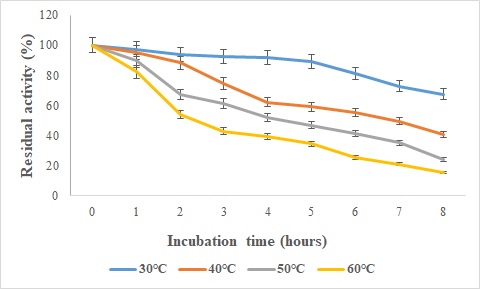 |
|
Phytic acid is not digested by monogastric animals due to deficiency of an enzyme (Phytase) in their digestive tube. Due to this reason, poultry industry needs to add potent phytase in its feed for faster growth rates. Therefore, phytase producing fungal isolates (64) were isolated and subjected to submerged fermentation and maximum production (21.79± 0.05 U/mL/min) was obtained by fungal isolate UJIIB-29, which was identified as Aspergillus oryzae after18S rRNA sequencing. Under optimized conditions, best results were obtained using glucose phosphate broth as a medium after 7 days of incubation, at 30℃, pH 5.5 with 0.5% glucose and 0.3% ammonium sulfate as carbon and nitrogen sources, respectively when it was inoculated with 4% conidial suspension. Purification of phytase by anion exchange chromatography resulted in 89.8% yield, 1.93 folds purification and 53.5 U/mg specific activity. The molecular weight of purified phytase was determined as 53 kDa whereas, Km and Vmax were determined as 3.41 mM and 24.6±0.05 U/mL/min, respectively. Thermodynamic studies of the enzyme revealed activation energy (Ea) and enthalpy of activation (ΔH) as 16.84 KJ/mol and 14.32 KJ/mol, respectively. Phytase showed enzyme activity up to 60℃ but at 30ºC and 5.5 pH, the enzyme showed maximum stablitity. The findings of the current study will help in developing an economical process for phytase biosynthesis. In addition, kinetic and thermodynamic studies will help in assessing applicability of phytase in harsh conditions.
Keywords: Phytic acid, Submerged fermentation, Optimization, Catalysis, Thermodynamics.
|
|
 |

